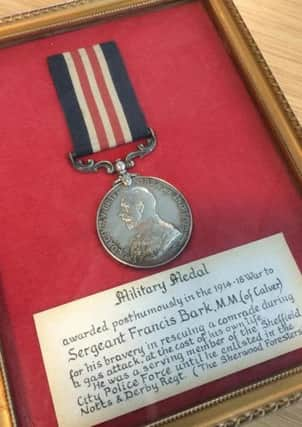Mystery behind WW1 medal found in Sheffield police station solved


In July, South Yorkshire Police made an appeal for information after a medal belonging to Sgt Francis Bark was found in a cupboard at South Yorkshire Police HQ at Carbrook, Sheffield.
Following the success appeal, officers have thanked members of the public who helped their enquiries.
Advertisement
Hide AdAdvertisement
Hide AdA spokesman said: “With a huge thank you to all of you who helped piece together the story of Sgt Francis Bark, we are pleased to tell the story of an officer/soldier who gave his life for others nearly 100 years ago.
“We are still working on verifying the links between a number of possible relatives of Francis and will continue this work. In the meantime, we are making arrangements with a military museum to display the medal as part of their collection. We’ll let you know more on this as soon as it is confirmed.”
Francis Bark was born in 1892 in Titchfield, Hants, to John Bark from Auld Hucknall in Derbyshire and Margaret Bark (nee Ockenden) from London. His father, John, was a gardener and gamekeeper and his work led the family to travel to Derbyshire by 1901.
Francis had a sister Lucy and Margaret and from 1901 they attended school in Curbar.
Advertisement
Hide AdAdvertisement
Hide AdAt the age of 19, Francis was living in Chatsworth View in Curbar and working as a woodman. Soon after, he joined Sheffield Police Central Division in May 1913 and qualified a month later where he continued his work as a constable until the start of the first World War.
As WW1 begun Francis enlisted in Sheffield. He quickly became Sergeant 24787 of the 9th Battalion of the Sherwood Foresters.
The Sherwood Foresters sailed from Liverpool to Gallipoli before moving to Egypt.
In July 1916, Francis’ battalion moved to France where it is believed he was part of an outpost which sighted a strong enemy patrol in France. The outpost party, including Francis, used their rifles to good effect and dispersed the enemy patrol inflicting heavy casualties.
Advertisement
Hide AdAdvertisement
Hide AdBy April 1918, they had spent a month on the line and must have been exhausted. A diary entry from 27 April 1918 states “the enemy burst 9 of our gas cylinders by shell fire amongst a post and working party of ‘A’ company 2 Lt Harding and fifty other rank casualties.”
Francis died five days later of gas poisoning aged 26. On the day of his death, Francis’ battalion were due to leave the frontline for a well-earned rest.
Following his death, Francis was awarded the Military Medal for “his bravery in rescuing a comrade during a gas attack, at the cost of his own life”. The medal was given to his father, and It is this medal which led South Yorkshire Police to look into Francis’ story.
Along with the medal, Francis left 14 shillings to John. John gave the medal to South Yorkshire Police as Francis’ employers.
Advertisement
Hide AdAdvertisement
Hide AdSergeant Francis Bark is now buried in Pernes British Cemetery in Pas de Calais and also has a headstone in St Peter’s, Endensor, Derbyshire Dales
Francis sister Lucy, a nurse, died in 1964 never having married.
Margaret, his other sister, married Henry Pratley in 1926. Together, they had daughter Rosemary Lucy Pratley in 1929. Margaret died in Tonbridge Wells in 1977.
Rosemary lived in Tunbridge Wells and married Patrick Clarke in 1953. Rosemary died aged 44, it’s not clear whether she had children.